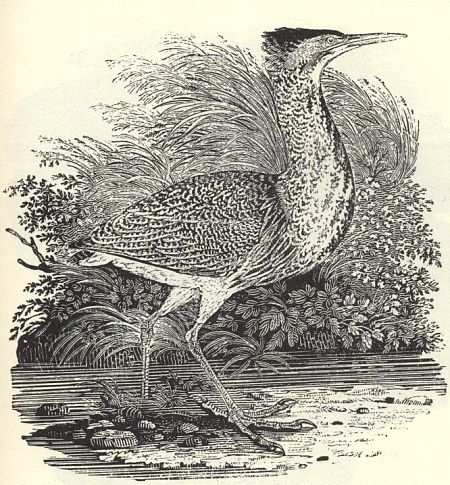January 14
Posted by sydney on Jan 14th, 2009

Bittern, T. Bewick
- 1793: January 14, 1793 – Snow-drops bud, & winter-aconites blossom. John White, & wife, & Holt White left us.
- 1792: January 14, 1792 – Lord Stawell sends me a cock & and hen brambling.
- 1791: January 14, 1791 – Ivy berries swell, & grow: there have been no frosts to check them.
- 1790: January 14, 1790 – A large speckled diver or loon was sent to me from the Holt, where it was shot by one of Lord Stawell’s servants as it was swimming & diving on a large lake or pond. These birds are seldom seen so far S. in mild winters.
- 1789: January 14, 1789 – The snow drifted in thro’ the tiling now melts, & floats the ceiling. A Gooseander & a Dun diver, a drake and a duck of the same species, Mergus Merganser, were brought me this morning. They are beautiful birds, never to be seen in the South but in hard frosts: they were shot on the stream at Hedleigh.
- 1786: January 14, 1786 – Sowed 36 bushels of peat-ashes on part of my farthest field, which has never been ashed since it was laid-down to grass. Qu: if it be right to sow ashes amidst so much rain & snow? So much moisture must probably dilute the ashes too much, & render them of no effect. Much snow on the ground. These ashes did no manner of good.
- 1782: January 14, 1782 – On this day Sr G. Rodney, after having been wind-bound for several weeks, sailed to the W. Indies from Torbay.
- 1781: January 14, 1781 – The ground is as hard as a rock. The roads & fallows are dusty.
- 1778: January 14, 1778 – The wind very still, for so low a barometer. Foxes abound in the neighbourhood, & are very mischievous among the farm-yards, & hen roosts. The fox-hounds have lately harrassed Harteley-woods, & have driven them out of those strong coverts, & thickets.
- 1776: January 14, 1776 – Rugged, Siberian weather. The narrow lanes are full of snow in some places, which is driven into the most romantic, & grotesque shapes. The road-waggons are obliged to stop, & the stage-coaches are much embarassed. I was obliged to be much abroad on this day, & scarce ever saw its fellow.
- 1775: January 14, 1775 – The hawk proinith, says the new glossary to Chaucer; this is picketh, or dresseth her feathers: from thence the word preen, a term in ornithology, when birds adjust, & oil their feathers.
- 1774: January 14, 1774 – Vast rain in the night whih thunder. A bittern was shot in shrub-wood. A dog hunted it on the foot, & spring it in the covert. On the same day Mr Yalden shot one in a coppice in the parish of Emshot: & about the same time on was killed in the parish of Greatham. Thses birds are very seldom seen in this district, & are probably driven from their watery haunts by the great floods, & obliged to betake themselves to the uplands. The wings expanded measured just four feet: the tail-feathers shafts & all were just five inches long, & 10 in number. The neck-feathers were very long, & loose like those on the neck of a roost-cock. These birds weighed undrawn, & feathers & all, each 3 pds & 2 oun: The serrated claw on each middle toe is very curious! Tho’ the colours on the bittern’s wings & back are no ways gaudy or radiant, yet are the dark & chestnut streaks so curiously blended & combined, as to give that fowl a surprizing beauty. Both the upper & lower mandible are serrated towards the point, & the upper is emarginated. Two of these birds I dressed, & found the flavour to be like that of the wild duck, or teal, but not so delicate. They were in good case, & their intestines covered with fat. In the crop or gizzard I found nothing that could inform me on what they subsisted: both were quite empty. I found nothing like the flavour of an hare! The flesh of these birds was very brown. It appears since that all these bitterns were killed in Selborne parish, & probably were all of the same family.
- 1772: January 14, 1772 – Vast white dew.
 Theme Ported to
Theme Ported to